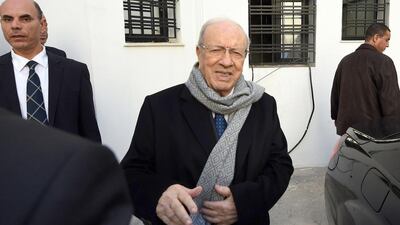TUNIS // Beji Caid Sebsi, the veteran political operator from the years before the revolution, is Tunisia’s new president.
Mr Caid Sebsi beat the incumbent Moncef Marzouki to win the run-off round of the presidential election with more than 55 per cent of votes cast. Mr Marzouki initially refused to accept the result, but later congratulated the victor.
The result means Mr Caid Sebsi’s Nidaa Tounes party now controls the presidency, appoints the new government and is the largest party in parliament.
Mr Caid Sebsi, 88, a French- educated lawyer, will take office, probably in the new year, as the first democratically elected president since independence from France in 1956.
Nidaa Tounes’s early claim to have won the election before the official announcement sparked clashes on Sunday and earlier on Monday.
Security forces used tear gas after stone-throwing protesters tried to set fire to a police station and a national guard post in El Hamma.
Two months ago, Nidaa Tounes, the party that Mr Caid Sebsi founded after the revolution that deposed Zine El Abidine Ben Ali, unexpectedly unseated the Islamists of Ennadha as the largest bloc in the new parliament.
Opponents of Nidaa Tounes regard it as largely an attempt to revive Ben Ali’s former ruling party, the Constitutional Democratic Rally, although it includes some leftist figures who support its stance of keeping religion out of state policy.
On the main avenue of central Tunis – where almost four years ago, in January 2011, a huge crowd converged on the once-feared interior ministry as the revolution reached the capital – the election result was openly discussed in the pavement cafes.
“We carried out our revolution, but it’s not finished yet,” said Mokhtar, 24, an electronics student having coffee with a friend. Both are Marzouki supporters.
Mokhtar recalled how under Ben Ali, Tunisians avoided any discussion of politics, and warned each other: “The walls are listening!”
On progress towards democracy, he said: “We have passed the first stage, and if the fear and corruption try to come back, we won’t let it.”
He was dismissive of much media coverage of the election campaign. “For Caid Sebsi, it showed only the positive. It never looked at the negative.”
Mr Marzouki, a former human rights activist, has been interim president for the past three years. He had trailed Caid Sebsi by just six percentage points in the first-round vote in November, when the two competed against 25 other candidates.
Mr Marzouki was elected interim president by the constituent assembly after Ennahda had secured the largest bloc in the new assembly.
He took his small, centre-left, non-religious party into a coalition government with Ennahda while other leftist parties shunned the Islamists, who they regarded as anti-democratic.
That was just 10 months after the revolution that overthrew Ben Ali’s authoritarian regime, triggering the other revolts of the Arab Spring.
In the vote for the constituent assembly, the Islamists had emerged as the most popular party in almost every constituency, including those abroad.
However, Sunday’s vote revealed a country divided along geographical as well as political lines.
Mr Marzouki, 69, led by a wide margin in the southern region.
Mr Caid Sebsi appears to have been successful in convincing many voters that his experience in previous decades could be applied in helping to run the country along democratic lines. He was three times a minister from the 1960s to the 1980s.
However, his record as head of the interior ministry in particular, from 1965 to 1969, is likely to come under some scrutiny as the country seeks to embark on a process of “transitional justice” next year under the new Truth and Dignity Commission, which last week began receiving applications from people who say they are victims of rights abuses.
Under Tunisia’s first post-independence president, Habib Bourguiba, who was in power until he was removed by Ben Ali in 1987, leftists and other dissidents were harshly repressed.
Under Ben Ali, however, the Islamists became the main focus of state repression.
In the capital’s Le Lac business district, brokerage houses reported strong buying activity on the small equities market on Friday before the run-off vote, in anticipation of a win for Mr Caid Sebsi.
“I don’t think there’s a risk of a return to authoritarianism, because Ennahda is capable of being a strong opposition in parliament,” said one trader, Aya. “My only reservation about Caid Sebsi is his age.”
She said worries about terrorism had hit the markets, and had also been important in winning votes for Mr Caid Sebsi, along with his international experience as a foreign minister.
Mr Caid Sebsi made security and restoring “the prestige of the state” central to his election platform, undertaking to give the army more resources to combat armed groups. Under Mr Marzouki, an ill-equipped army took scores of casualties.
Mr Marzouki’s bid to continue as president enjoyed the support of many Ennahda sympathisers, since the Islamist party did not field a candidate.
His platform of defence of the civil liberties won in the revolution, along with a determination to combat poverty, also drew support from non-aligned voters as the best guarantee that there would be no return to authoritarianism or single-party rule.
The new constitution approved in January shifts power to the prime minister and parliament, retaining the president as a head of state who will direct foreign and security policy.
Sheikh Mohammed bin Zayed, Crown Prince of Abu Dhabi and Deputy Supreme Commander of the UAE Armed Forces, congratulated Mr Caid Sebsi on his election win, wishing him every success.
foreign.desk@thenational.ae
* With additional reporting from Agence France-Presse

